![Rafał RIEDEL (ed.)
Śląsk – 10 lat członkostwa w Unii Europejskiej
[Silesia – 10 Years of EU Membership]](/api/image/getissuecoverimage?id=picture_2015_34078.jpeg)
Rafał RIEDEL (ed.) Śląsk – 10 lat członkostwa w Unii Europejskiej [Silesia – 10 Years of EU Membership]
A book review: Rafał RIEDEL (ed.) Śląsk – 10 lat członkostwa w Unii Europejskiej
More...We kindly inform you that, as long as the subject affiliation of our 300.000+ articles is in progress, you might get unsufficient or no results on your third level or second level search. In this case, please broaden your search criteria.
![Rafał RIEDEL (ed.)
Śląsk – 10 lat członkostwa w Unii Europejskiej
[Silesia – 10 Years of EU Membership]](/api/image/getissuecoverimage?id=picture_2015_34078.jpeg)
A book review: Rafał RIEDEL (ed.) Śląsk – 10 lat członkostwa w Unii Europejskiej
More...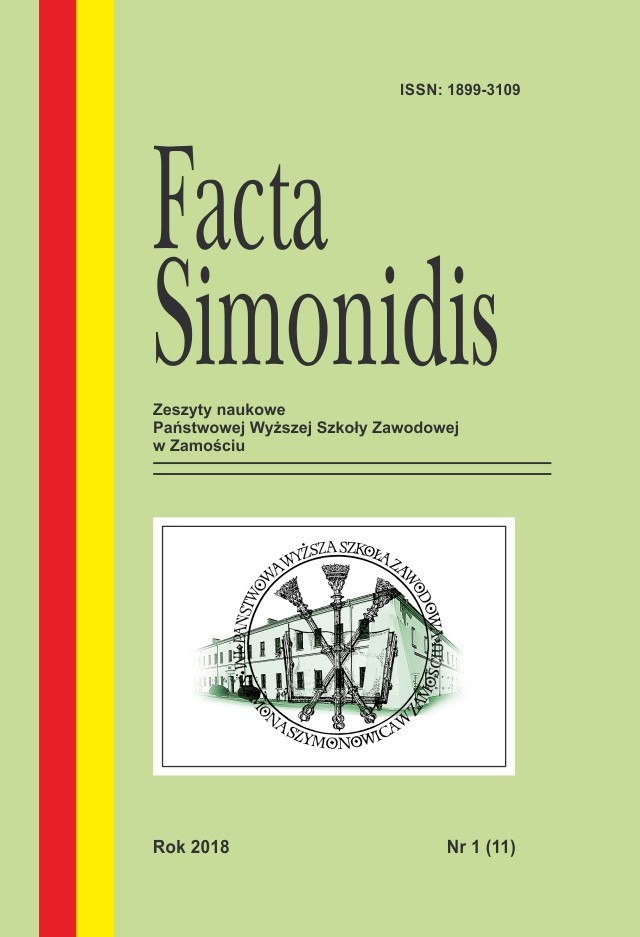
This article tackles the issue of territorial cohesion, which is an integral part of the European Union cohesion policy. The analysis refers to the method of abstracting the territorial cohesion policy set from the other policies, economic cohesion policy and social policy, showing the course of its evolution and sanctioning in the European Union normative sphere. The analysis concerns both internal and external (global) situation of the Union which affects the dynamics of the development of territorial cohesion and policies related to it. Finally, the article presents concrete examples of programs which reflect the main goals and objectives of territorial cohesion policy, their creation and place in the Union lawmaking.
More...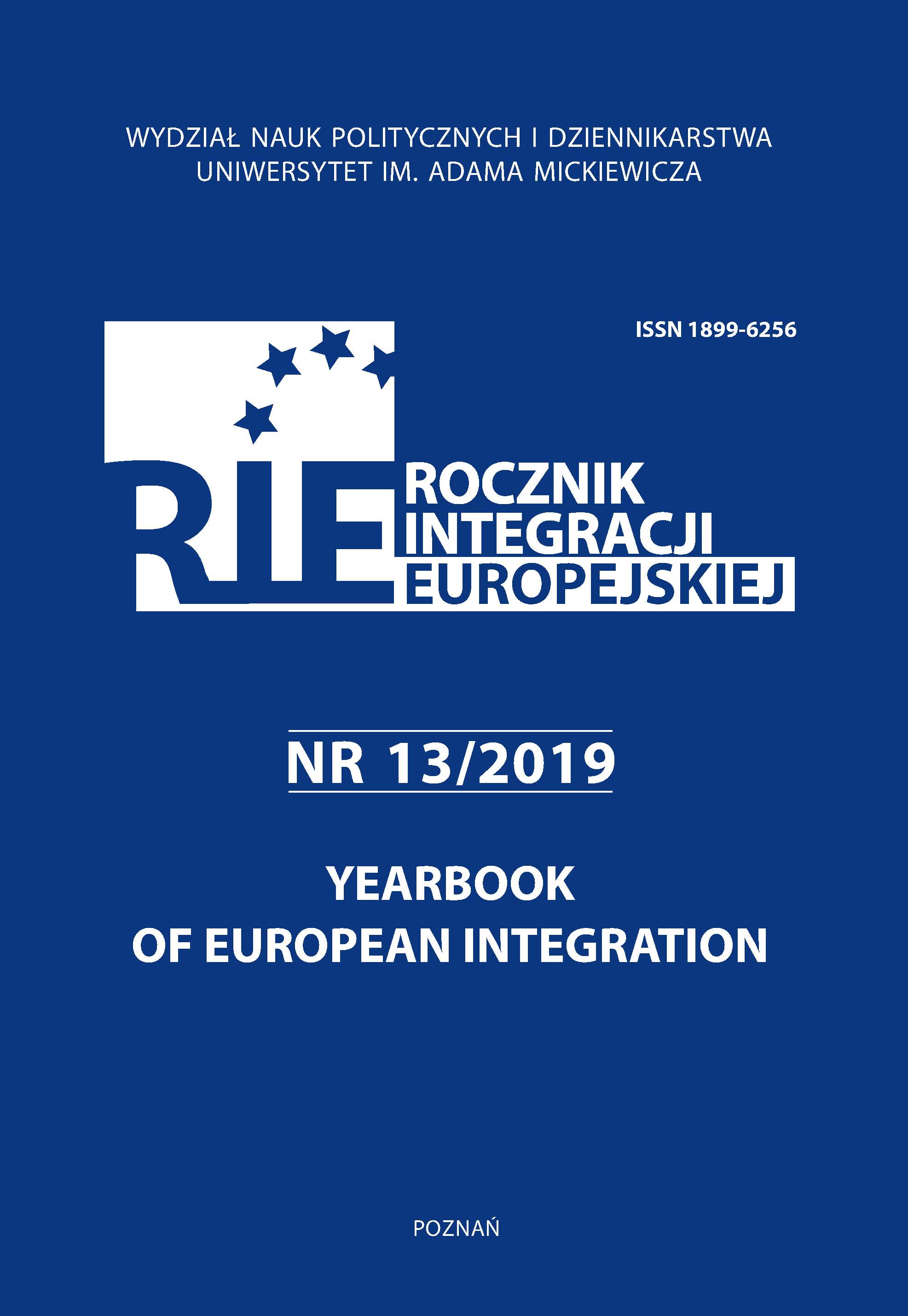
The paper proposes a research approach for the examination of the involvement of the High Representative of the Union for Foreign Affairs and Security Issues (High Representative) in the policy-making process. The point of departure is constituted by the predominant view reflected in the literature of the High Representative being solely a constrained agent of the national capitals as a collective principal. A key limitation of the role of the High Representative seems to be that the decision-making power remain in the hands of the Member States. The proposed model introduces the category of a policy entrepreneur and shall examine to what extent, by acting as such, the High Representative can manage to enhance her discretion in relations to the collective principal.
More...
The subject of the research is change of Germans policy towards Africa in security area from culture of restraint to the responsibility policy (proposal of president Joachim Gauck and security minister Ursula von der Leyen). German security policy towards Africa based on multilateralism and allied obligations. Germans society tends to be skeptical about effectiveness of sending german armed forces to Africa.
More...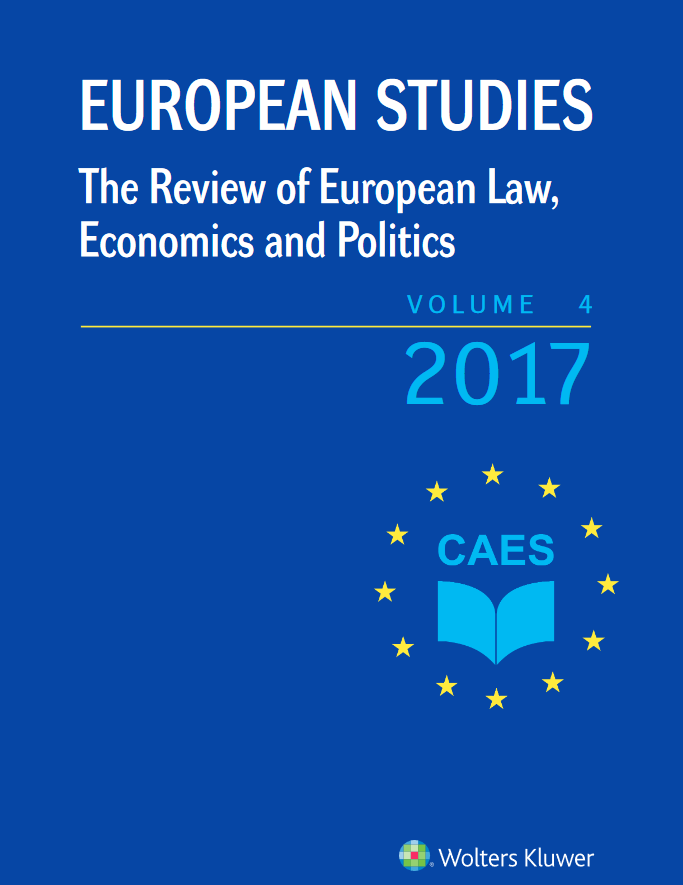
In many legal systems, documents confirming the rights of the heirs and other people benefiting from the inheritance are issued in order to confirm the rights to the inheritance acquired. The purpose of such documents is to present the rights under mortis causa legal succession to a third party, and legitimisation of the right currently vested in the entitled person, or solving of the possible doubts. Since the respective instruments documenting the rights to inheritance are only of territorial nature, with the entrance into force of the EU Succession Regulation, the European heirs were offered a new instrument of trans-border consequences – the European Certificate of Succession. This new Certificate was supposed to eliminate the previous imperfections in the system of documenting succession rights. After nearly two years of applying the new legal act it may be assumed that the new provisions have not dispelled the doubts.
More...
This article describes the use of instrument of commitments in the practice of application of the competition law of the European Union by the European Commission in energy sector. The article explores the reasons for increase in use of this instrument for resolving potential distortions of competition in energy sector, but also in other key sectors of the EU economy, as well as possible pros and cons of this approach. The text offers complex overview of the EU competition law provisions and summaries of documents by the European Commission and the Court of Justice of the European Union related to the topic. The article also enumerates and summarises the cases in which the European Commission accepted the commitments in the energy sector of the EU.
More...
With the successful 2016 BREXIT campaign, populist citizen demands directed the U.K. as a nation State to reclaim its diminished sovereignty and under Article 50 negotiations, to leave the European Union. Yet the negotiated transition of the U.K. and its 2019–2021 transitioni period carries with it potential implications not only for the future of the U.K. as a nation State and its legitimate expression of sovereignty but also for the remainder of 27 States who will need to reintegrate their partnerships within the regional bloc after the U.K. exits. This commentary proposes a 21st century GeoNOMOS model for the continuum of State sovereignty that outlines a core function for the State, constructs a framework of liberty that respects diversity, cultural heritage, domestic institutions while it promotes a new set of organizing principles in a society of economic traders. The GeoNOMOS model as proposed here, outlines a broad application not only for the U.K. as it restructures its sovereign function apart from the EU but also for those 27 remaining EU partnership States that struggle with the rise of populism across the Continent that demand more fiscal accountability and a centralized migration program within the European Union as a regional institution. Creating this new context for the 21st century expression of legitimate State sovereignty would potentially allow the U.K. to develop new best practices for other States to emulate and to lead a global conversation on matters related to the changing role of the nation State. The model outlined here defines sovereignty in terms of a State’s two key functions: [1] first and foremost, how the State cares for its own people, protecting participatory democracy and individual liberty; and then, [2] how a State protects its domestic institutions as it successfully engages on an international level within the “international community of states” and within a marketplace guided by capitalist globalization.
More...
This chapter of the monograph examines the historical, current, and possible future political and economic consequences of the United Kingdom’s referendum result to leave the European Union. The article briefly examines the roots of the British involvement in the European project and identifies some of the ideological differences between the UK and continental Europe. The author will also discuss the current position on the UK EU negotiations and the progress they have been making (or as the case may be the lack of progress). This will culminate in an examination of the possible outcomes of Brexit for both the UK and the certain member states of the EU in economic and political terms.
More...
The traditional explanations of preference formation of the member states of the European Union stress the importance of structural (GDP, net incomes from the EU budget, level of economic development) and institutional factors (type of negotiation forum, level of negotiations, presidency of the Council, regional governance). In this paper we will focus on the third group of possible explanation, namely the ideational factors and their role in formulating the attitudes of member states’ governments on the issue of European integration. Apart from short-term preferences, governments have long-term strategies on the European integration. In this paper we will introduce a model of explaining the integration strategies of new member states of the European Union on the basis of ideational factors.
More...
Enlargement policy is one of the key foreign policies of the European Union and is implemented with countries that, primarily geographically, belong to the European space. The goal of the enlargement process is that non-member countries, through joint work and dialogue with the bodies of the European Union, to fulfill the prescribed conditions and become full members of the EU. The enlargement process is also supported by significant EU financial intervention, which is made available to non-member countries in the form of the Instrument for Pre-Accession Assistance. The Instrument for Pre-Accession Assistance is essentially a financial instrument for implementing Brussels' foreign policy towards countries aspiring to EU membership. This pre-accession support to the enlargement process helps beneficiary countries to improve their administrative, economic, legal and overall social capacity to implement EU standards in their countries. In accordance with the intention to accelerate the reform process, the European Union has adopted a new enlargement methodology. According to the new enlargement methodology the Instrument for Pre-accession Assistance for the period 2021-2027 (IPA 3) has been formated in principle and content. IPA 3 is tailored to maximize the effects of financial support on the enlargement process as much as possible. The changes are significant and are expected to contribute to accelerating the implementation of reforms and meeting the criteria. The link between financial assistance and the enlargement process has never been clearer, and the evaluation of the "applied commitment" of the beneficiary countries will be easier to assess than ever before.
More...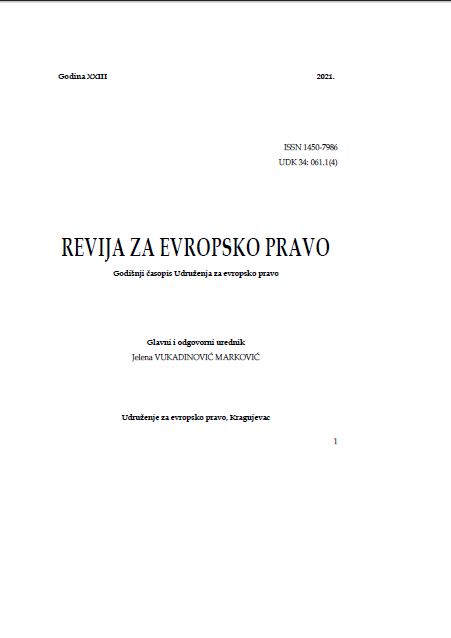
Alignment with the Common Foreign and Security Policy of the EU is one of the major challenges for Serbia in the process of accession to the European Union. Among other candidate countries, except Turkey, Serbia has the lowest percentage of compliance with declarations and decisions under the Common Foreign and Security Policy (CFSP). The New accession methodology adopted by the Council of the EU last spring places greater focus on fundamental reforms that include alignment with the CFSP. In this regard, candidate countries will be required to show greater credibility and stronger political leadership. The New accession methodology introduces for the first time the Union's geostrategic approach to enlargement policy in the Western Balkans. Such an approach reflects the greater importance that will be given to the issue of CFSP harmonization. Candidate countries are expected to confirm their European choice through clear foreign policy positions that are in line with the CFSP. After Serbia officially accepted the New Accession methodology, the Council decided in May 2021 on its application to Serbia. It is envisaged that within the Intergovernmental Conference and the Stabilization and Association Council, progress in harmonizing Serbia's foreign policy with the CFSP will be regularly monitored. In this article, the author discusses the possible consequences of the application of the New Accession Methodology on the harmonization of Serbia's foreign policy with the CFSP.
More...
Worldwide, great efforts are being made in order to establish sustainable development at all levels. European Union (EU) member states are obliged to meet the requirements in the area of environmental protection. In this paper, the authors conducted a comparative study of environmental attitudes among young people from both EU transition countries and EU candidate countries. The objective was to determine the differences in environmental attitudes, environmental awareness and self-efficacy of the youth from these two groups of countries and the EU environmental policy implementation level. Results indicated that the influence of EU membership exists when it comes to the environmental attitudes of youth from the analyzed countries. Average values showed the unsatisfactory situation regarding environmental awareness and self-efficacy of respondents. In order to define the relations among environmental attitudes, self-efficacy and environmental awareness, a structural model was created. This analysis showed that these three components work the same way in both groups of countries.
More...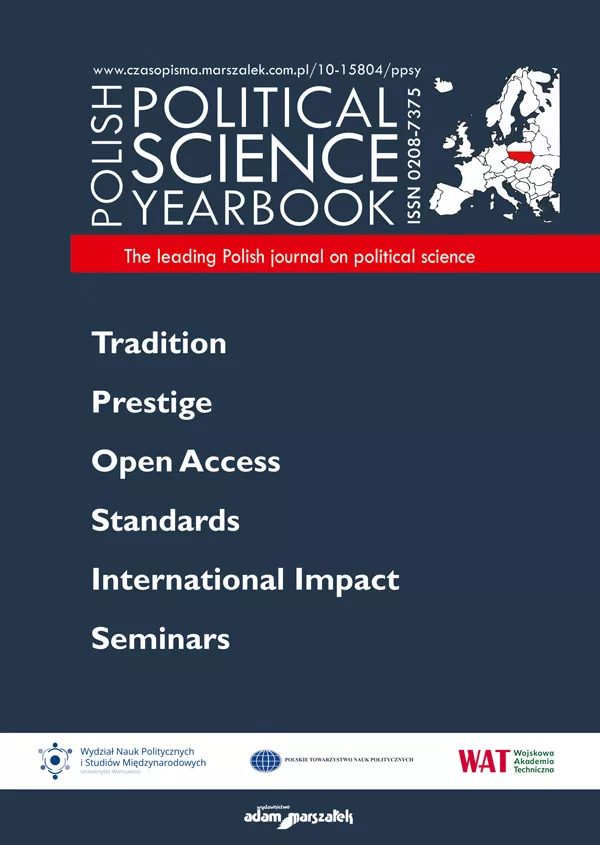
The following paper employs a normative approach and focuses on the problem of the current state of the local self-government in the South Caucasus countries: Georgia, Armenia, and Azerbaijan. Since all these countries are members of the Council of Europe, a reference point for decentralisation is the European Charter of Local Self-Government. The paper's main thesis is that despite showing some similarities, the countries have introduced different models of decentralisation that do not fully meet the Council of Europe’s criteria. Such variation is in line with the different political systems of these states and their level of democratisation. The more democratic the state is, the stronger the decentralisation it has adopted. Thus, decentralisation in Georgia follows the European model of public policy, while Azerbaijan is preserving the former Soviet model of weak self-government, with central authorities playing the leading role in public services. The current changes in Armenia’s model resemble the Georgian track of reforms. The findings of this paper may be applicable both in further theoretical research and in implementing reforms of local self-government in various post-Soviet states.
More...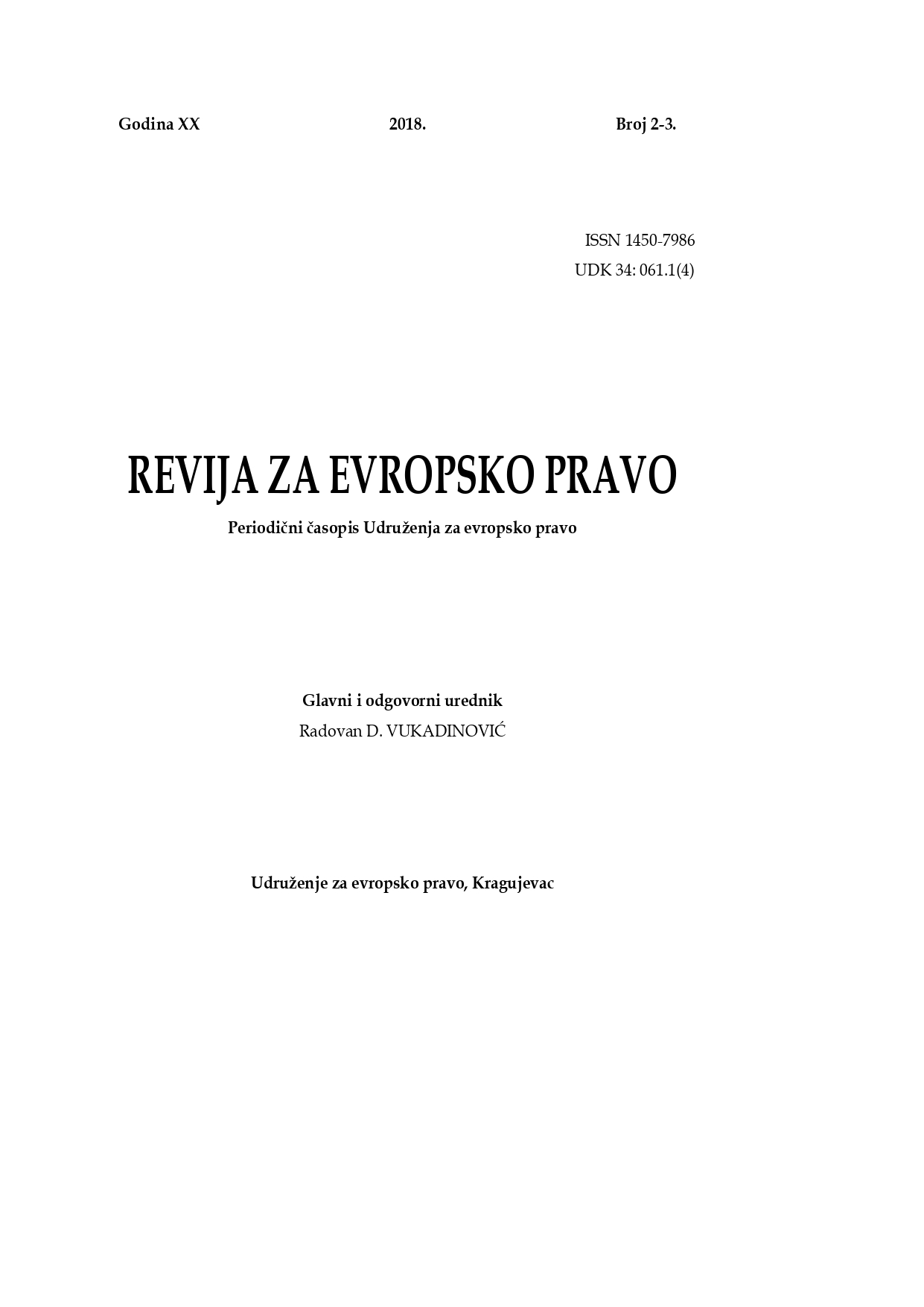
The regional or cohesion policy of the European Union (EU) is one of its most important common policies. It was created and developed in order to increase the well-being of all European regions through various measures to combat regional differences. Economic, social and territorial disparities have been identified as one of the biggest challenges for further progress of development processes within the EU, which should be opposed by increasing economic growth, employment and strengthening competitiveness, which is one of the most important objectives of regional policy. In this paper we will look at the emergence and development of the legal framework on which the EU's regional policy is now based in order to understand its importance and role in the construction of the EU as we know it today. First we will examine the first phase of regional policy from 1957-1975 which legal framework was initiated by the creation of the Council of European Municipalities and the Region, and then developed through the European Social Fund and the Treaty on the Functioning of the EU until the creation of the Association of Border European Regions as the beginning of the idea of Euroregionalism. EU regional policy is entering its second phase in 1975, when the European Regional Development Fund was established as an important instrument. It was further developed first through the adoption of the Single European Act of 1986, and later through the implementation of the so-called Delors Packages 1 and 2. Particularly important was the new regional policy position in the Maastricht Treaty of 1993, which established the Cohesion Fund (another important instrument), as well as the Committee of the Regions.
More...
Kosovo unilaterally declared independence without Serbia's agreement and without approval of the UN Security Council. Today, Kosovo has been recognized by 110 UN member countries, including 23 EU Member States. The negotiation of the Stabilisation and Association Agreement (SAA) started in 2013 and the SAA was signed in October 2015, which means that Kosovo is included in the EU accession process. Stabilisation and Association Agreement is the accession instrument that presumes legal cooperation of the EU with the potential candidate state. In that respect, there is a risk of incoherence between EU policies and between EU and MS politics towards Kosovo. Firstly, the Treaty of Lisbon puts a major imperative on the process of straightening the coherence between Unions policies and activities. It is the obligation of the Union to ensure consistency between the different areas of Union's external action and between these and its other policies. Also, the Treaty prescribes stronger obligations for Member States to support the Union's external and security policy actively and unreservedly in a spirit of loyalty and mutual solidarity. Secondly, following the Lisbon Treaty, which conferred legal personality to the European Union, the Stabilization and Association Agreement was concluded in the form of an EU-only agreement, involving the EU on one side and Kosovo on the other side. Moreover - five EU countries have not recognized Kosovo. Conclusively, this is a case of a potential candidate state that is not recognized by five Member States, which causes concern over the future functioning of the EU. This paper will analyze the current regulation that produced this situation and propose changes that could contribute to a better functioning of the EU.
More...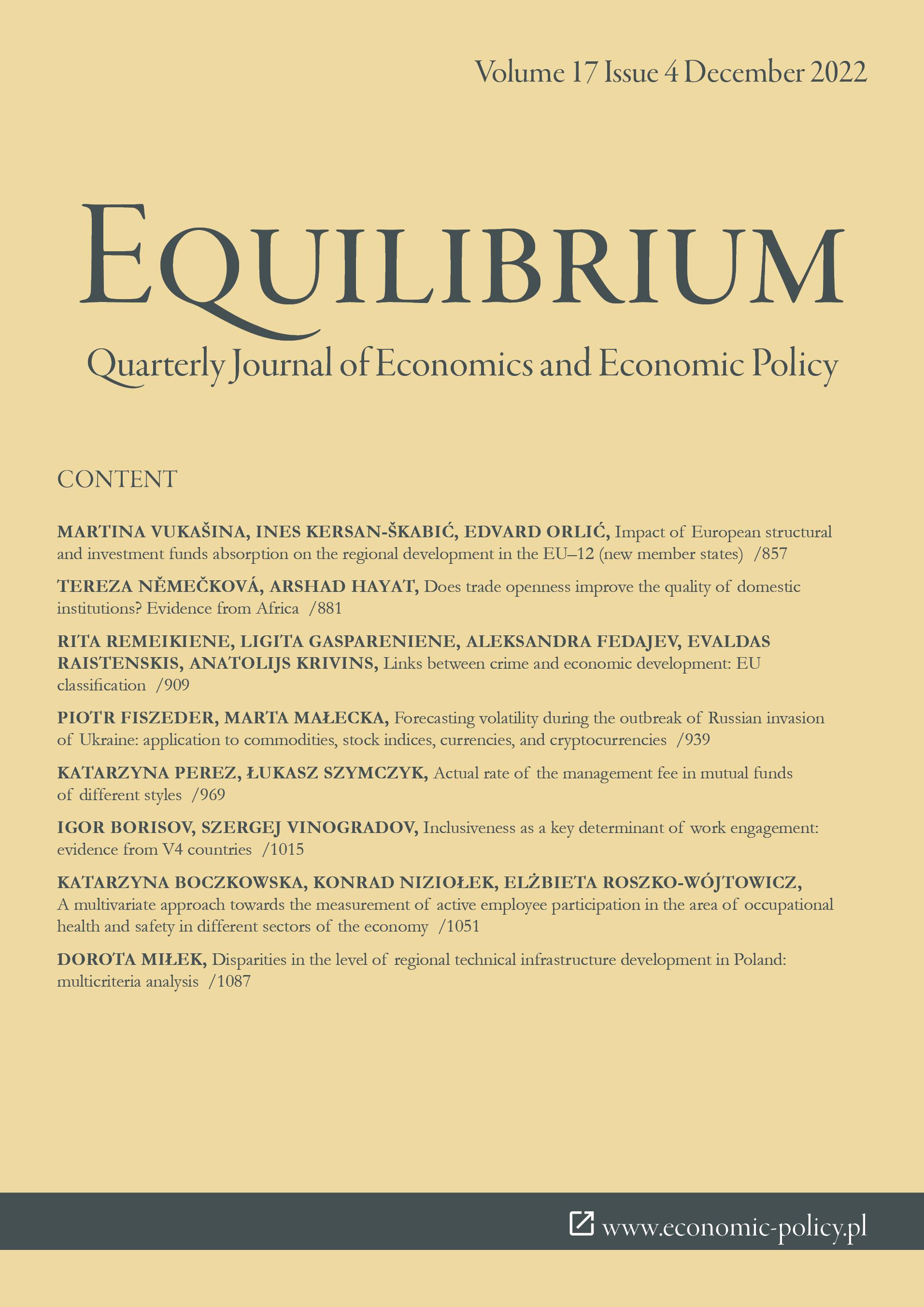
Research background: The development policy currently promoted by the European Union is focused on the use of the territory?s internal resources. Among the factors affecting regional development, by building its potential, infrastructure, being a basic necessity for developing activity in a given area, is of significant importance. Hence, investment in infrastructure is critical to stimulating economic dynamism, as it is the basis for supporting a variety of measures aimed at economic growth.Purpose of the article: This paper aims to evaluate the level of development of technical infrastructure and changes taking place in this field in Polish voivodeships in 2008 and 2020.Methods: The study was carried out using the Hellwig development pattern method and a comparative analysis of the technical infrastructure of Polish regions. The above approach makes it possible to measure the diversity of the state and availability of infrastructure for the communities of the regions.Findings & value added: While implementing the study aim, particular attention was paid to the spatial differences in the level of development of the technical infrastructure of Polish voivodeships. The analysis enabled to distinguish groups of voivodeships with the highest, high, low, and very low level of technical infrastructure development. From a long-term perspective, the conducted research can be seen as a contribution to existing research and serve to further compare the impact of technical infrastructure on the economic development of countries. The strength of the study is the adequately long time span of the analysis (2008 ? the period of the financial crisis and 2020 ? the COVID 2019 pandemic), which provides a basis for the formation of the infrastructure in question. The added value of the article is also a regional perspective on the level of development of technical infrastructure using multidimensional methods of statistical analysis. The results of the study can be used to make decisions at the national level regarding the retrofitting of infrastructure in regions with a low level of infrastructure development. For the European Union's decision-makers they can be a source of knowledge of where to direct EU funds the purpose of which is the infrastructural development of regions.
More...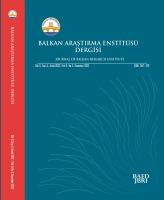
Today, Albania, which is a candidate country for the European Union (EU), is facing difficulties on the road to full membership. This situation has reasons related to Albania as well as the EU. This study aims to discuss whether the integration model of the Approach of Variable Geometric Europe can be an option for Albania, by examining those reasons. The method of the literature review was employed, and written sources were analysed in the study. There are some theoretical explanations concerning how European integration can be realized. When contributions of policy makers are examined, it is seen that flexible and differentiated integration models were suggested beside classical integration theories such as functionalism, intergovernmentalism, institutionalism, and constructivism. Academic studies, on the other hand, show that the Approach of Variable Geometric Europe constitutes a subclass of the concept of differentiated integration. This approach has importance in fast and easier integration, and in solving the problems of the countries which have serious challenges and are lagging behind the core and other member countries. Consequently, our study analysing Albania in this context, claims that the Approach of Variable Geometric Europe, as a suitable integration way, can contribute to Albania while it is struggling to overcome political and economic difficulties in its integration process.
More...
The article deals with the issues of cooperation between the European union and the council of Europe in the field of culture. it discusses basic joint programs to support culture as a driver of sustainable social and economic development; promoting culture and intercultural dialogue in peaceful relations between communities and strengthening cooperation in the field of cultural heritage.
More...
The aim of the article, consisting of two parts, is to present selected aspects concerning the assessment of the functioning of european works councils in the EU member states based on the results of own empirical research. it is about showing the strengths and weaknesses of these institutions of social dialogue and indicating recommendations to strengthen them, so that they can better implement the right to information and consultation. the first part presents general views on ewcs and their potential as assessed by the respondents. the second part, on the other hand, is devoted to issues that require improvement.
More...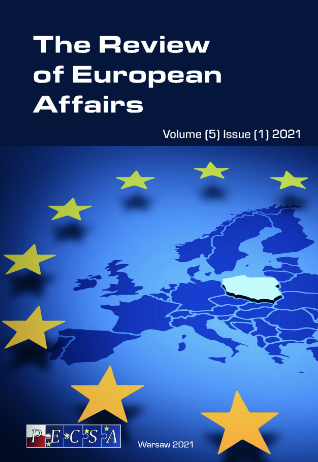
Przedstawiony artykuł wpisuje się w tematykę zmian społecznych i gospodarczych spowodowanych przez pandemię COVID-19. Celem artykułu jest przedstawienie szerokiego zakresu działań realizowanych przez Unię Europejską w celu walki z pandemią COVID-19 oraz jej konsekwencjami gospodarczo-społecznymi i ocena, jak mogą one wpłynąć na funkcjonowanie Unii Europejskiej w przyszłości. W artykule zaprezentowano podstawę prawną działań Unii Europejskiej w zakresie ochrony zdrowia oraz reakcję Unii Europejskiej na pandemię i jej konsekwencje. Autor dokonuje przeglądu finansowej i organizacyjnej odpowiedzi na kryzys spowodowany przez COVID-19, w szczególności dotyczącej udostępnienia szczepionek, wsparcia dla systemów opieki zdrowotnej oraz wsparcia dla gospodarek. Autor wnioskuje, iż Unia Europejska, pomimo początkowej opieszałości, ostatecznie prawidłowo zareagowała na wyzwania związane z COVID-19, tworząc liczne mechanizmy wsparcia dla gospodarek oraz dla obywateli. W szczególności sukcesami są: wspólne zakupy szczepionki i innych środków medycznych i ochronnych; bezpośrednie wsparcie dla narodowych systemów ochrony zdrowia; pośrednie i bezpośrednie wsparcie dla gospodarek. Nie do przecenienia jest też fakt, że zaistniały kryzys wykazał, iż oczekiwania społeczeństw państw członkowskich wykraczają znacznie poza przyznaną Unii legitymację traktatową w sprawach ochrony zdrowia oraz że stworzenie narzędzi pomocowych przyśpieszyło pierwszy krok w kierunku unii fiskalnej (pożyczki na rynkach finansowych / emisja obligacji). Artykuł odwołuje się do materiałów źródłowych instytucji europejskich i opracowań dotyczących skutków gospodarczych i społecznych pandemii. W artykule zostały wykorzystane metody analizy instytucjonalno-prawnej oraz analizy systemowej.
More...